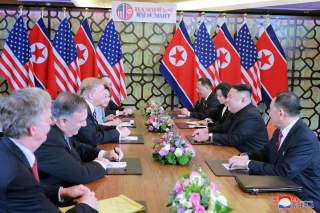Why American Talks with North Korea Should Not Be About Denuclearization
Instead, Washington must focus on the big picture—the future of Northeast Asia itself.
The Singapore Joint Statement – as have other past joint statements – affirmed the denuclearization of the Korean Peninsula as a joint goal. But North Korea’s Central News Agency in December clarified that it won’t denuclearize until the US removes the military threat near the peninsula. Negotiations require concessions from both sides, but if this is the price of denuclearization, the costs may be too high for Washington. Congress has keenly guarded US military presence on the peninsula by inserting a clause in the 2019 National Defense Authorization Act (NDAA) conditioning the drawdown of USFK. Anxious that Trump may concede core pillars of the alliance in Hanoi, Senators Cory Gardner and Edward Markey, Chairman and Ranking Member of the Senate Foreign Relations Subcommittee on Asia, stated that Congress will “fight like hell” to prevent such an outcome. In a positive demonstration of support for the US-ROK alliance, the House Foreign Affairs Committee in November passed House Resolution 1149, articulating the view that the alliance is strategically significant not just in meeting the North Korean threat, but an exemplar of values and principles – in short – a joint vision for the future of Asia.
In strategic terms, the United States Forces Korea (USFK) troop presence in South Korea represents a visible and a powerful commitment to South Korean security. Functionally, USFK has operated under a “tripwire” logic to assure adversaries that the United States would aid South Korea in the event of a conflict. It would set a dangerous precedent if the 28,500 troops were reduced based on insistence from Pyongyang rather than the jointly agreed upon defense and deterrence requirements of Seoul and Washington. Troops stationed in Korea also serve to preserve US influence in Northeast Asia and deter Chinese expansionism beyond the second island chain. South Korea is the only foothold with a US troop presence in the Pacific rim of the Eurasian landmass. The peninsula is also a geo-strategically advantageous position from which to deploy assets to Taiwan in the event of a conflict. Osan Air Base in Korea is 800 miles from Taiwan, while Misawa Air Base in Japan and Guam are nearly twice as far.
Korea experts around Washington have reached all the way back to text from the 1953 US-ROK security treaty to make the case that the alliance is about more than just North Korea. The treaty indicates that the alliance exists to deter “an armed attack in the Pacific area.” But in reality, the text was inked nearly seven decades ago in vastly different circumstances. South Korea has never consented to the full strategic flexibility of USFK or the unrestrained deployment of assets off of the peninsula to aid US forces. The recent controversy over deployment of the Terminal High Altitude Area Defense (THAAD) ballistic missile defense system in Korea and resulting “Three No’s” agreement with Seoul is Beijing’s challenge to South Korean security under the alliance. This agreement limits South Korea’s participation in a US- led regional missile defense system and an institutionalized structure of trilateral military cooperation with Tokyo and Washington. This episode presages the difficulties that a growing US-China strategic rivalry will pose to Seoul’s national security strategy. However, if Washington plays a key role in enabling a new modus vivendi with North Korea, it could consolidate the alliance bond that China has been eager to enervate and open up new strategic priorities for the US- ROK alliance.
Conclusion
While the world recognizes North Korea’s demonstrated capability, acknowledgment is the political component that requires some measure of accommodation necessary for improved relations. Foregoing maximalist policies and pursuing practical, principled engagement with North Korea could manage the security situation on the peninsula while reinforcing alliances, expanding US influence, and freeing up resources to address greater strategic priorities. Engaging in arms control discussions, improving the political relationship by declaring an end to the Korean War, and seeking political buy-in from Congress are key steps towards this goal.
This article was first published on March 15, 2019 as a paper in Pacific Forum’s Issues and Insights series.
Joshua Nezam is a consultant and independent researcher in Washington, DC. He is a former Boren National Security Fellow in Seoul and received MA degrees in international affairs from Korea University in Seoul and American University in Washington, DC. His experience spans multiple policy domains, including US Embassy Seoul, the House Foreign Affairs Subcommittee on Asia and the Pacific, and the Asian Studies program at the American Enterprise Institute. His writing has been published in The Korea Herald, The Diplomat, PacNet, and The National Interest. Image: Reuters

